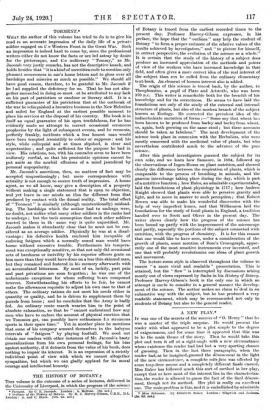TORMENT. *
WHAT the author of this volume has tried to do is to give his read_rs an accurate impression of the daily life of a private soldier engaged on e Western Front in the Great War. Such an impression is indeed hard to come by, since the professional writers either do not know the facts or are led astray by desire for the picturesque, and tl:e unliterary "Tommy," as Mr. Jacomb very justly remarks, has not the descriptive knack, and holds besides that "it is a kind of unwritten code to mention only pleasant occurrences in one's home letters and to gloss over all hardships and miseries as much as possible." We should all have good reason, therefore, to be grateful to Mr. Jacomb if he lad supplied the deficiency for us. That he has not alto- gether succeeded in doing so must ot be attributed to any lack on his part of patriotism or candour or literary skill. It is a sufficient guarantee of his patriotism that at the outbreak of the war he relinquished a lucrative business in the New Hebrides and sailed for England at the earliest possible moment to place his services at the disposal of his country. His book is in itself an equal guarantee of his open truthfulness, for he has evidently made no attempt to correct occasional erroneous prophecies by the light of subsequent events, and he recounts, perfectly frankly, incidents which a less honest man would have been tempted irresistibly to colour or suppress : and his style, while colloquial and at times slipshod, is clear and unpretentiou -, and quite sufficient for the purpose he had in view. His relations, too, With his comrades seem to have been uniformly cordial, so that his pessimistic opinions cannot be put aside as the morbid effusions of a mind jaundiced by personal unpopularity.
Mr. Jacomb's assertions, then, on matters of fact may be accepted unquestioningly ; but mere correspondence with actuality is not enough to ensure truth of impression. A house agent, as we all know, may give a description of a property without making a single statement that is open to objection, and yet leave in our minds an Hea far different from that produced by contact with the dismal reality. The total effect of " Torment " is similarly (although unintentionally) mislead- ing. The hardships which the author had to undergo were, no doubt, not unlike what many other soldiers in the ranks had to undergo ; but the tacit assumption that such other soldiers reacted to them in th) same way is quite unjustified. Mr. Jacomb makes it abundantly clear that he must not lie con- sidered as an average soldier. Physically he was at a disad- vantage: his defective health rendered him incapable of enduring fatigues which a normally sound man would have borne without excessive trouble. Furthermore his tempera- ment was exceptionally sensitive, so that not only did occasional acts of harshness or incivility by his superior officers grate on him more than they would have done on a less thin-skinned man, but they remained and fostered in his memory afterwards with an accumulated bitterness. By most of us, luckily, past pain and past privations are soon forgotten ; he was one of the unfortunate exceptions for whom suffering bcars compound interest. Notwithstanding his efforts to be fair, he cannot make the allowances requisite to adjust his own case to that of others. The ordinary rations do not meet his needs either in quantity or quality, and he is driven to supplement them by parcels from home ; and he concludes that the Army is badly fed. An ordinary route march wearies him to the point of absolute exhaustion, so that he "cannot understand how any men who have to endure the amount of physical exertion that we Tommies get, can possibly have enthusiasm for strenuous sports in their spare time." Yet in another place he mentions that some of his company amused themselves in the halcyon intervals of " fatigues " by playing football. We need not detain our readers with other instances of Mr. Jacomb's hasty generalizations from his own personal feelings, for his bias against authority, if it detracts from the value of his book, does nothing to impair its interest. It is an expression of a strictly individual point of view with which we cannot altogether sympathise, but which we can gladly applaud for its moral courage and intellectual honesty.


































 Previous page
Previous page